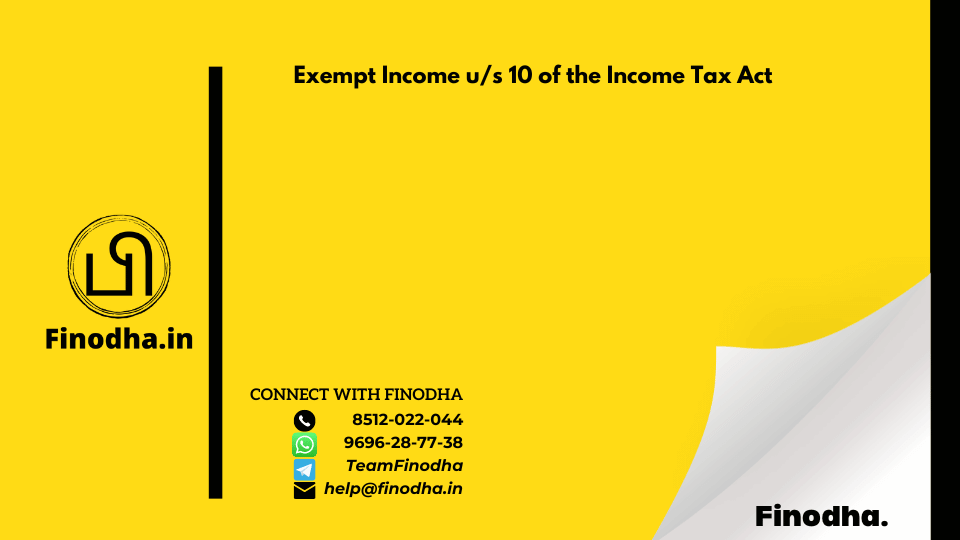Important Keyword: Capital Gains, Exempt Income, Income Interest, Income Source, Provident Fund.
Table of Contents
Exempt Income u/s 10 of the Income Tax Act
It’s a common misconception that any income earned is subject to taxation. However, certain types of income fall under the category of Exempt Income according to section 10 of the Income Tax Act, meaning there’s no tax liability on them. Exempt income can take various forms, such as interest received from PPF or agricultural land, among others.
What is Exempt Income?
Exempt income pertains to specific types of earnings that are not taxable under the Income Tax Act’s provisions. This differs from deductions under income tax, where deductions are claimed against taxable income. In essence, exempted incomes are excluded from a taxpayer’s total taxable income, while deductions are applied to taxable incomes.
Types of Exempt Income
Agriculture Income:
Income derived from agricultural activities is exempt from taxation under the Income Tax Act. However, this income must be accounted for in the total income calculation to determine the applicable tax slab rates. As a result, it indirectly impacts taxation by potentially pushing non-agricultural income into higher tax brackets.
Gifts from Relatives:
Gifts received from relatives are not subject to taxation. This exemption extends to gifts received during marriage ceremonies or through wills. Additionally, monetary gifts from non-relatives up to INR 50,000 are also exempt from tax.
Long Term Capital Gains:
As of the financial year 2018-19, long-term capital gains (LTCG) up to INR 1,00,000 are not taxable. Previously, gains from the sale of stocks and equity mutual funds were exempt from tax under section 10(38), though this provision does not apply to debt mutual funds.
Interest on Securities:
Income from securities such as interest and premium received from government-issued bonds, certificates, and deposits is tax-free. This includes bonds issued by entities like NHAI, IRFC, and REC.
Profit Share from Partnership Firms:
The share of profits from a partnership firm or LLP is exempt from tax in the hands of the partner. However, interest on capital and remuneration received may be taxable.
Provident Fund:
Payments received from Provident Fund (PF) are exempt under Section 10. However, withdrawals from PF before completing five years of service may be taxable. For EPF, withdrawal is permissible under certain conditions.
Gratuity:
Gratuity received by government employees is tax-free. In the case of private organization employees, gratuity is exempt from tax subject to specific conditions.
Commuted Pension:
Commuted pension received by government employees is entirely tax-free. Other employees may also enjoy tax exemption on commuted pension subject to certain conditions.
Other Exempt Income
Life Insurance:
Payments received from a life insurance policy are exempt from tax under section 10(10D) of the Income Tax Act. This exemption applies to both the maturity amount and death claims.
Receipts from HUF:
Any funds received from the family income are tax-free for the member of a Hindu Undivided Family (HUF). For instance, if a family owns an impartible estate, any amount received by a member from the family estate’s income is exempt from tax.
Scholarships and Awards:
Scholarships or awards granted to deserving students to cover educational expenses are exempt from tax. The entire scholarship amount receives this tax exemption.
Amount Received under VRS (Voluntary Retirement Service):
Employees receiving amounts under voluntary retirement schemes, as per Rule 2BA of the Income Tax Rules, are eligible for tax exemption of up to Rs. 5,00,000 from the retirement amount received.
Allowance for Foreign Services:
Indian residents providing services outside the country and receiving allowances or perquisites abroad are exempt from income tax under section 10(7) of the Act. This provision ensures that allowances and perquisites received by government servants while working overseas remain tax-free.
Reporting of Income in ITR
Taxpayers can disclose their exempt income when filing their income tax returns each year. Exempt income should be reported in the “Exempt Income” section under the “Computation of Income and Tax” tab in ITR-1 and ITR-4. By adding a row, selecting the nature of income from the dropdown list, and entering a description and amount, taxpayers can accurately report their exempt income.
For ITR-2 and ITR-3, taxpayers should report non-taxable income under Schedule EI, which stands for Schedule Exempt Income. Details should be provided for various types of exempt income, including Interest Income, Agriculture Income, Income not chargeable as per DTAA, and other exempt income, selecting the relevant option from the dropdown list. This income is reported separately and not included in the Gross Total Income.
Disclosure of Exempt Income for Salary and Non-Salary Allowances
For individuals with salary income, exempt income should be disclosed under Schedule S – Details of Income from Salary when filing income tax returns using ITR-2. Various exemptions such as House Rent Allowance (HRA), Leave Travel Allowance (LTA), Leave Encashment Amount, Pension Amount, Gratuity Amount, and any perquisites received, including amounts received from a Voluntary Retirement Scheme, should be reported here.
For self-employed individuals or those without salary income, certain incomes fall under the category of exempt income. These include agricultural income, interest on funds, and other income, which must be disclosed under Schedule EI while filing income tax returns.
Read More: Tax on Dividend Income
Web Stories: Tax on Dividend Income
Official Income Tax Return filing website: https://incometaxindia.gov.in/





0 Comments